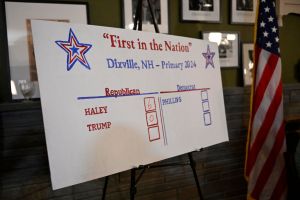By now, The Spectator knows better than to say that Donald Trump has been definitively beaten. The President’s final defeat has been proudly proclaimed and then undermined so many times that the wisest course is to assume he will always rise again. Nevertheless, while Trump has not officially given up, he seems to have failed in his quest to win a second term.
But the President did not fail in the hearts of his supporters. Most will agree: they did not lose this race — it was stolen from them. In the late hours of November 3, the President’s lead seemed insurmountable, his victory inevitable. Defying the polls, he romped to easy wins in Florida, Texas, Iowa and Ohio. The New York Times needle showed him on track to win Georgia by four points. Election night tallies showed him ahead by hundreds of thousands of votes in Wisconsin, Michigan and Pennsylvania. On the betting website Bovada, Trump’s odds of victory peaked at nearly 90 percent just after 11 p.m. ET.
Everyone knows what happened after that. For the President’s supporters, and the president himself, there is only one explanation. Fraud. Shenanigans. Perfidy. Theft.
The Spectator — notwithstanding the contrary opinions of some of its wise contributors — finds this unlikely. Unlimited time and investigative resources would doubtless find hundreds of fraudulent ballots, the product of rogue actors doing their best to marginally affect the outcome. But Joe Biden’s margins in the critical states were measured by the thousands and tens of thousands. And it wasn’t the big, infamously corrupt urban counties that took Biden over the top in the critical states; it was suburban counties that turned against the President, transforming his narrow 2016 victory into a narrow 2020 defeat. The President’s loss, as shocking as it seemed in the moment, was likely legitimate.
But in any democratic system the perception of fairness matters nearly as much as the real thing. And if Trump’s voters are mistaken in thinking their candidate was robbed, they are correct to think that America’s voting system is in dire need of reform.
The cause of this mistrust is obvious: Biden’s election victory, instead of coming suddenly, was drawn out like a long, agonizing death. In Wisconsin, it took until early Wednesday morning for him to take the lead. In Pennsylvania and Georgia, it took until the Friday. Slow counting wasn’t limited to closely contested states. Two weeks after ‘Election’ Day, New York still hadn’t counted roughly 15 percent of its votes. This slow counting was paired with one of the longest and least-regulated voting periods in the country’s history.
It doesn’t matter if evidence of widespread fraud has been limited. It is obvious that mass mail-in voting and days of drawn-out counting maximize opportunities for chicanery. A drawn-out election is an election that invites fraud, and the suspicion of fraud. If Washington’s preferred presidential candidate in Ukraine had a large lead on election night only to lose after three days of ‘mail-in ballots’ swung the balance behind a rival, the cries of Russian malfeasance would be deafening. The same Republicans who urged Trump to concede this race would be speculating about military intervention.
Without much debate, and with much cheerleading from the press, America is morphing into one of the banana republics it spent so much of the 20th century meddling with. In Pennsylvania, mail-in ballots could be counted with no postmark and without a signature match. In California, paid political operatives were allowed to harvest ballots by the hundreds from voters, and mail-in votes could arrive and be counted until November 20. Voter ID laws come and go almost at random, and voting machines have no uniform standard.
There is absolutely no need for all this absurdity. In France, postal votes have been banned in most circumstances since the 1970s, due to mail-voter fraud. In Germany, electronic voting machines were ruled unconstitutional on the grounds that they require specialist knowledge beyond most voters. In the Netherlands, postal voting is only available for those outside the country on election day. The country has eliminated all electronic voting and tallying: every single vote in the country is cast and counted by hand. Miraculously, without any of the 21st-century technology that America grossly overpays for, the Netherlands has no trouble tallying votes quickly. Polls close at 9 p.m. and the final results are often in by midnight.
America could learn from all these examples. And, in fact, it must. Because if America tries to make it through a future truly close election with the mess of a system it has now, democracy may not survive. A repeat of the 2000 Florida debacle, with the presidency coming down to just a few hundred votes in a massive state, would almost certainly end in street violence or worse. The only way America can prevent such a disaster going forward is to have an electoral system the public can understand and trust.
And so it’s past time that America brought its voting into the 21st century by bringing it back to the 19th. Voting should be on paper ballots, counted by hand by volunteers. Early voting is fine, but absentee voting should return to its original purpose: allowing those who will be absent on Election Day to cast a vote. Voter ID should be a given. Above all, America must reclaim the idea of ‘election night’. Counting should be finished in hours, not days or weeks. Otherwise, the world’s most powerful democracy risks becoming just another failed one.
This article was originally published in The Spectator’s December 2020 US edition.


















